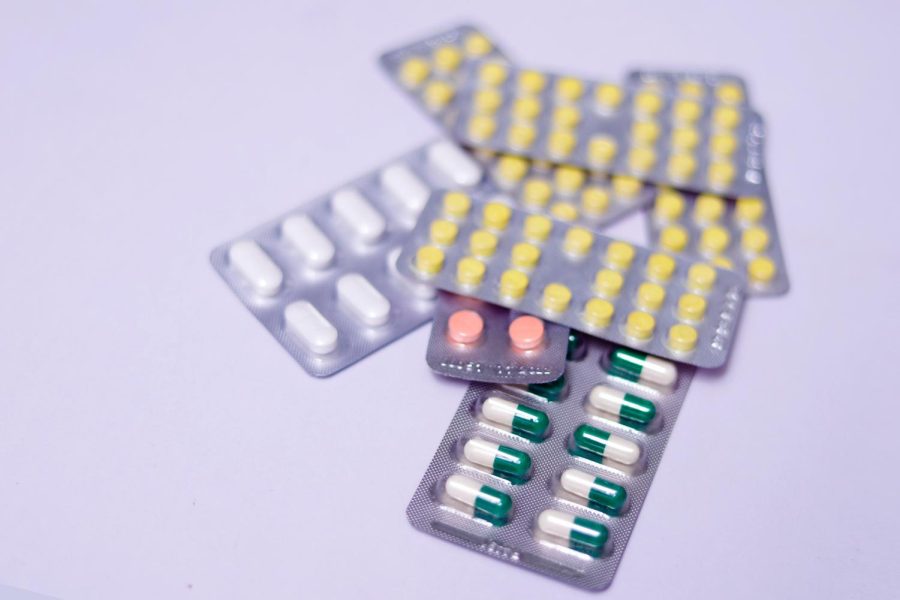The Legalization of Drugs
melany_tuinfosalud on Unsplash
Photograph of prescribed drugs.
November 30, 2022
*The opinions expressed within the content are solely the author’s and do not reflect the opinions and beliefs of the website or its affiliates.*
The US drug issue is a major problem.
In the past half-century, we have had unprecedented levels of drug addiction and overdose deaths. The criminalization of substances has exacerbated this issue and has caused enormous amounts of hardship to people in America and across the world. Since 1999, the US has seen a 460% increase in drug overdose deaths, and the problem is not coming to a close anytime soon. The primary drug category responsible for this increase is opioids, which accounted for close to 80% of the 92,000 drug overdose deaths in 2020 involving an opioid.
Although it may seem like the current addiction crisis is occurring because of easy legal access to drugs, there are many crucial distinctions to make between this prescription crisis and convenient drug access. The first critical distinction to make is that the current addiction crisis is caused by the overprescription of drugs rather than the sale of them. For example, 75 percent of people addicted to opioids began their use through prescription drugs.
Purdue Pharma, the primary distributor of opioids within the US fought hard to maintain loose restrictions on prescribing their addictive opioid, Oxycontin. When someone is prescribed an addictive chemical they are pressured to ingest it, often without knowing the consequences. If addictive drugs were legalized, the government would need to provide oversight and restrictions on drug purchases.
Our addiction treatment systems must become easy to access without the fear of legal repercussions so we can treat the illness of addiction with the best chance of success. Furthermore, legalizing drugs would allow their sale to be more transparent to the government, as their purchase would be in common stores and shops like any other item. This would vastly increase the government’s ability to respond to cases of addiction. An optimal system would be a national registry of drug users that could be easily implemented if drugs were purchased in a public space so that people who are addicted can be easily found and given the help they need.
Of course, education about addiction is necessary and needs to be more aggressive than the current “Just Say No” campaign. Stronger educational efforts in underprivileged areas about the potential harms of drug use would also help reduce people’s chances of overdosing.
One case study on the decriminalization of previously illegal substances can be found in Portugal. Following the decriminalization of recreational opioids in Portugal in 2000, drug overdose fell by 80%. On top of that, cases of HIV contracted through opioid use fell from 56% of all HIV cases to only 6%. The key to this success was that Portugal fought addiction by helping people recover rather than imprisoning them. These kinds of policies could be easily implemented in the US and would have similar effects.
Though the data supports this, many say that the legalization of substances is too risky and criminalization is the only safe option. However, this was not the case during the US Prohibition era in the 1920s. Alcohol was made illegal to sell overnight and what followed was the most crime-ridden time during United States History. Rather than making alcohol less common, criminalization made sales more frequent and less safe. Soon organized crime began to boom.
The similarities between the Prohibition era of the 1920s and the criminalization of drugs today are striking. However, unlike current drug laws, under Prohibition it was still legal to produce alcohol for personal use. This legalization prevented many from entering criminal consumption circles. Unfortunately, the opposite is true currently with illicit drugs. Many drug users unwillingly become involved with criminal organizations in order to source their substances. Should drugs be even partially legalized, current crime levels would likely reduce as it did in the Prohibition era.
Much of foreign drug-related crime and death has been directly at the hands of the American government and their policies. Many instances of US clandestine support for drug traffickers could be named. Among these would be in Nicaragua, Panama, Colombia, Haiti, China, Afghanistan and Australia. These occurrences have been so widespread that Dennis Dayle, a former head of an elite unit within the DEA, stated, “In my 30 year history in the Drug Enforcement Administration and related agencies, the major targets of my investigations almost invariably turned out to be working for the CIA.”
The legalization of drugs within the US would inevitably remove all money flow to these drug traffickers in South America and their military power would slowly fade away without the money supply. The world would become a safer place without these criminals having this kind of immense funding and backing.
The influx of tax collection because of legalizing a massive market would also benefit the government’s budget. Around $400 billion dollars is spent on illegal drugs each year in America and the tax money made off this sale could be used to help communities suffering from endemic drug addiction and helping prevent overdose deaths.
Legalizing an industry that is currently controlled by criminals would also allow it to be more heavily regulated. Similar to the use of alcohol following the Prohibition era, the legalization of the recreational drug industry would be dominated by producers who openly sell. Then following that, the government can make sure the drugs are used in a safe manner and that the users have no fear that they will be incarcerated because of their drug use. Alongside giving people a safe place to take drugs and maintain their health while doing it, there needs to be less of a stigma associated with taking drugs. The stigma our society has against drugs leads to people using substances in secret with little to no social support. This only can lead to worse outcomes and is solvable simply by legalizing drug use.
Historically, the criminalization of drugs, specifically cocaine and marijuana, was done in order to attack opponents of the status quo. Nixon’s war on drugs was a prime example of such policy manipulation.
“The Nixon campaign in 1968 . . . had two enemies: the antiwar left and black people . . . by getting the public to associate the hippies with marijuana and blacks with heroin, and then criminalizing both heavily, we could disrupt those communities, ”White House Counsel under Richard Nixon John Ehrlichman said.
This type of attitude towards drugs haunts underprivileged communities, especially black communities to this day. Throughout the drug war, this position on targeting minorities was clearly shown in the scheduling of marijuana and heroin as schedule 1 drugs, which is the most heavily criminalized schedule under the Controlled Substance Act. The sentencing disparities imposed by Reagan in 1986 would hurt inner-city black people especially. One ounce of crack cocaine, which was used more by black people, would have the same penalty as 100 ounces of powder cocaine, which was more likely to be used by richer whites.
Legalizing drug use would remove the fear associated with it and allow addicted users to find medical help. We need to realize that criminalizing addiction is not the solution. We should have a more compassionate approach to drug addiction and treat it as what it is: a disease. Without consistent medical help people will not be able to shake addiction and will turn to criminal activity or die from overdose.
If the clear answer to drug addiction is decriminalization, then why hasn’t it been implemented in the United States? The answer lies in the perverse incentives that many American industries have in drug use. Police often have implicit quotas on how many arrests to make. They also receive more funding from the government through the war on drugs. On top of this, they get more money through so-called “civil asset forfeiture.” Police Unions know this and lobby the government to keep drugs illegal. Private prison companies make millions of dollars off of the incarceration of drug users and fund anti-drug politicians and groups that push policies like harsher sentencing and keeping drugs criminalized. Alcohol companies, pharmacies and prison guard unions are other institutions that have ulterior motives for supporting drug war policies.
Many opponents of drug legalization say that it is counterintuitive to legalize a substance if our goal is to reduce its usage. However, it is not the amount of drug use that is dangerous, but the inability to use them safely. With the ease of smuggling addictive drugs, a punitive method of preventing people from consuming substances will not address the root cause of addiction. It is the difficulty in finding help with addiction that actually pulls users into drug-related disease and overuse. In order to resolve the true issues with drug use, we must directly counter drug addiction and abuse.
Our lasting image as a country should not be one that criminalizes addiction. As much as small changes such as decriminalization of marijuana help, we truly have to move towards legalization of all illegal substances. From realizing how our government’s war on drugs has worsened the drug addiction problem and increased crime rates, to helping people get back on their feet if they are suffering, we have a lot to do to fix the problem of drugs in our society.






Lexy Smith • May 8, 2023 at 9:15 pm
Dennis Dayle was my grandfather. Linda was my mother and Ursula was my grandmother. I only met him once but recently inherited all of his possessions from my mothers recent passing. Quite an incredible career he had and it has been truly incredible learning about it from his own words and the words of his family at the time in letters and personal, personal correspondences and tapes. I love seeing him still remembered to this day.